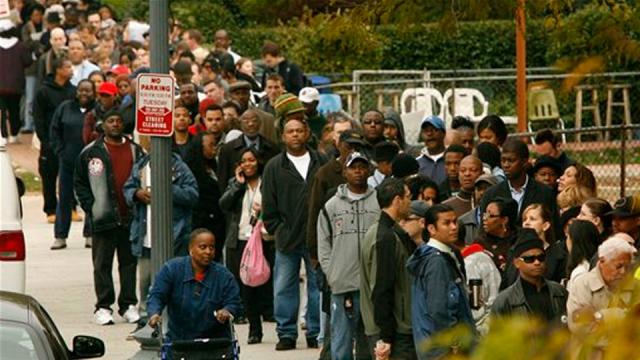
A new study by an esteemed university confirms what many urbanites already believe but couldn’t prove: voting precincts with more black voters have to endure much longer wait times to cast ballots because they are allotted fewer machines, fewer poll workers and fewer resources than their Caucasian counterparts.
The research by the Brennan Center for Justice at New York University School of Law prove that, along with new voter I.D. laws and other impediments, the process for voting by African Americans is made more cumbersome than other demographics and, in some cases, nearly insurmountable.
The media and public were outraged by the images of voters standing in long lines at the polls in the November 2012 election. While the persistence and perseverance of the voters was admired, it nevertheless illuminated the haphazard election administration system.
“In early 2013, President Barack Obama convened a bipartisan commission to address the problem of long lines and determine best practices for local election officials. According to the commission’s findings, 10 million people waited longer than half an hour to vote in 2012,” the study concludes. “The commission concluded that no voter should wait more than 30 minutes, and issued recommendations for election officials to improve the casting of ballots. Almost two years after the 2012 election, however, policymakers have done little to prevent long lines from recurring.”
The Brennan study is produced at a particularly sensitive time in Georgia and around the country. There could be a major paradigm shift in political power if just a small increase in voter turnout occurred. Many political pundits predict Democrats will lose control of the Senate unless African-Americans turn out to vote in larger-than-usual numbers for a midterm election. In states like Georgia and North Carolina, an increase of just 2 or 3 percent in the Black turnout could mean the difference between Democratic or Republican victory.
In fact, at a recent voter registration rally in Georgia, first lady Michelle Obama pointed out that if just 50 Democratic voters per precinct who didn’t vote in the 2010 midterms came out in November, it could change the Georgia Senate seat from Republican to Democratic, and it would mean Democratic candidate Michelle Nunn was victorious.
The Brennan Center studied Maryland, South Carolina and Florida, the states where voters faced some of the longest lines in the country. While the center points out that it couldn’t conclude that any jurisdiction or person intentionally discriminated against any group of voters, the findings were clear that Blacks and also Latinos suffered because of a lack of resources in their districts.
The study produced these major major findings:
- Voters in precincts with more minorities experienced longer waits.
- Voters in precincts with higher percentages of minority voters tended to have fewer machines.
- Precincts with the longest lines had fewer machines, poll workers, or both.
- There is widespread noncompliance with existing state requirements setting resource allocation.
- The Brennan Center report found that both Maryland and South Carolina set certain requirements for what polling places are supposed to provide voters, but just 25 percent of the precincts studied in South Carolina and 11 percent of the precincts in Maryland complied with these requirements.

